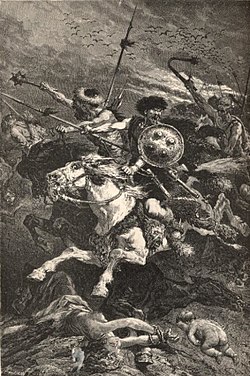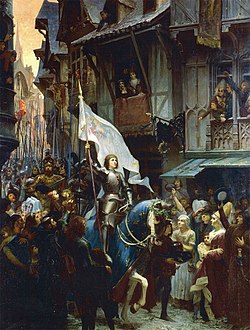And indeed, after two days of searching the horizon in vain, on the third day Aragorn spied Gandalf astride a white horse cast in a pearly glow, leading the Riders of Rohan down upon the orcish rear, peeling them away from the seige and destroying them.
Now, Tolkien was a scholar of the era and so could not have been ignorant of a certain passage in Gregory of Tour's History of the Franks.
And Attila king of the Huns went forth from Metz and when he had crushed many cities of the Gauls he attacked Orleans and strove to take it by the mighty hammering of battering rams. Now at that time the most blessed Annianus was bishop in the city just mentioned, a man of unequaled wisdom and praiseworthy holiness, whose miracles are faithfully remembered among us. And when the people, on being shut in, cried to their bishop, and asked what they were to do, trusting in God he advised all to prostrate themselves in prayer, and with tears to implore the ever present aid of God in their necessities. Then when they prayed as he had directed, the bishop said: "Look from the wall of the city to see whether God's mercy yet comes to your aid." For he hoped that by God's mercy Ætius was coming, to whom he had recourse before at Arles when he was anxious about the future. But when they looked from the wall, they saw no one. And he said: "Pray faithfully, for God will free you this day." When they had prayed he said: "Look again." And when they looked they saw no one to bring aid. He said to them a third time: "If you pray faithfully, God comes swiftly." And they besought God's mercy with weeping and loud cries. When this prayer also was finished they looked from the wall a third time at the old man's command, and saw afar off a cloud as it were arising from the earth. When they reported this the bishop said: "It is the aid of the Lord." Meanwhile, when the walls were now trembling from the hammering of the rams and were just about to fall, behold, Ætius came, and Theodore, king of the Goths and Thorismodus his son hastened to the city with their armies, and drove the enemy forth and defeated him. And so the city was freed by the intercession of the blessed bishop, and they put Attila to flight.
-- Gregory of Tours, History of the Franks, Book II, ch. 7.
If you saw the movie, you felt an involuntary thrill, a soaring of the heart, when you saw Gandalf and the relieving army appear and charge the rear of the orcs. You can imagine too the soaring joy felt by the people of Orleans when they spied in the mid-afternoon sun the eagles of the last Roman army on earth marching to their rescue with old foes at their side. Ave, Aetius! Hail, Theodore. Even the Franks were there, for this country, though no longer Gaul, was not quite yet France.
(And a thousand years later, the watchers on the walls of Orleans saw the Maid appear to relieve the long English seige.)
Then out spoke brave Horatius, the Captain of the Gate:
"To every man upon this earth, death cometh soon or late;
And how can man die better than facing fearful odds,
For the ashes of his fathers, and the temples of his Gods,
Speaking of fearful odds, Lars Porsena of Clusium had a considerable army to take Rome, but the three heroes held the narrow way before the bridge as it was chopped down behind them. Modern scholars, unable to imagine such people as Horatio or Joan or the rest, like to downplay these things or denigrate them or even suppose they could not have happened. But such words ring hollow from the lips of men to whom no statues will ever be raised.
Then too no one says that the fight must be a physical one, either. There are other walls to defend; other bridges to hold. One thinks of Guy de Chauliac in the Black Death meticulously recording the progression of the plague that ravaged his body; or Jesse Lazear allowing yellow fever mosquitoes to bite him. They had hope that their research would save others.
A few years ago TOF happened to hear on the radio an opinion-monger named Limbaugh deride the virtue of Hope, which he seemed to confuse with a sort of wishy-washfulness rather than the muscular Christian virtue. Vir-tue comes from vir, which gives us vir-ile and other strong words, which is why virtus translates as "strength." Hope is why you keep on fighting and you don't sit down and weep and wish that someone will come and make things right. Someone may come, like Gandalf or Aetius or the Maid, but to no good purpose if you haven't held on until then. And that is why the situation is not hopeless; because if there were no Hope, there would be no reason to go down fighting rather than to go down running. To paraphrase Chesterton, any fool can hope when success lies in view. It takes genuine strength to hope when matters seem hopeless. And that is why Hope is the mother of Courage. And Courage, as often as not, the mother of Joy.
“You must not lose hope,” said Joachim.
The Kratzer turned his great yellow eyes on the monk. “Hope! One of your ‘inner words.’ I know what you signify by ‘swine’ or ‘palfrey’ or ‘schloss,’ but what is ‘hope’?”
“When all else is lost,” Joachim told him, “it is the one thing you may keep.”
-- Eifelheim




Speaking as a scholar, I suggest you read some Dumezil before you insult the mythological reading of Roman pseudo-history. (That it is pseudo has been known since the work of another giant, Mommsen, in the nineteenth century. Nothing recorded before about 275 BC is reliable, and almost everything before 390 is unacceptable.) The legend of Horatius and Mutius Scaevola has profound and intellectually fascinating roots, that can lead a competent reader to the most amazing intellectual adventures and to the discovery of important AND TRUE facts. Incidentally, don't imitate GK Chesterton out of place. When he said "you shall not be a legend, I assure you", he was not speaking of Horatius, or of comparative mythology in general, but of the specific matter of the historicity or otherwise of King Arthur - a character hugely different, in his role and significance, from Horatius, and one whom, as it happens, I have proved to be historical. Beware of anti-intellectualism; it is always ultimately poisonous, however brightly it may shine.
ReplyDeleteGandalf and Aragorn are mythic, too. Myths are always true, even if they are not always fact.
DeleteIncidentally, the Christian virtue is hope IN GOD, which does not mean that you have to have any hope in your present political, military or economic position. To the contrary, to insist on hoping when hope makes no sense may be a kind of idolatry, like the Germans indulged in both world wars - we are masters by nature, it is impossible (whatever the appearances) that we could really be defeated. Giving up hope in circumstances like that is common sense, and it can and does go with hope in the Lord in another way. Gregory I the Great, one of the greatest saints in the calendar, lived at a time when the Emperor of Constantinople still "hoped" to restore the lost Empire in the West, even when the Longobards had made a hash of the brief Byzantine conquest of Italy. Gregory could see clearly, and knew that the Longobards were there to stay. He made himself hated, almost to the point of murder, in Constantinople, because he refused to follow their anti-Longobard policies, opting rather for a policy of mixed resistance and recognition. He was right, and the future belonged to him. He had despaired of the Empire - a deadly sin in the eyes of patriotic Romans then - and trusted in the Lord, and the Lord made the Italian nation, with all that was to follow, out of that decision.
ReplyDelete"Such words ring hollow from the lips of men to whom no statues will ever be raised." That's going to be my standard retort in political discussions from now on.
ReplyDeleteAbout raising statues:
DeleteI met a traveller from an antique land
Who said: `Two vast and trunkless legs of stone
Stand in the desert. Near them, on the sand,
Half sunk, a shattered visage lies, whose frown,
And wrinkled lip, and sneer of cold command,
Tell that its sculptor well those passions read
Which yet survive, stamped on these lifeless things,
The hand that mocked them and the heart that fed.
And on the pedestal these words appear --
"My name is Ozymandias, king of kings:
Look on my works, ye Mighty, and despair!"
Nothing beside remains. Round the decay
Of that colossal wreck, boundless and bare
The lone and level sands stretch far away.'
And about people who will never have statues in this world:
King of saints, to whom the number
Of Thy starry host is known,
Many a name, by man forgotten,
Lives forever round Thy throne;
Lights, which earth-born mists have darkened,
There are shining full and clear,
Princes in the court of Heaven,
Nameless, unremembered here.
Of course, there is a world of difference between "having statues raised in one's honor" and raising one's own statues.
DeleteDude! Buzz kill!
DeletePlease note the context in which I proposed using the phrase: political discussions. In America, in this day, is there a less serious form of discourse? Sad, but true?
Merry Christmas!
As far as Tolkien goes, for all I know he really was inspired by the story, though not so much in the siege of Helm's Deep as in the Siege of Gondor.
ReplyDeleteWe all appreciate modern history, of course, with all its down-to-earth scientific focus. I do remember, however, another quote from Chesterton, that "if history is to be taught at all, it is to inspire". True, imagining Horatio may come to us with some difficulty, but does it tell more of his legendary nature or of our smallness? And which stirs your heart to greater deeds - the reading of Le Goff's "Medieval Europe" or Regine Pernoud's tales of Alienor of Aquitaine?
There's no Regine Pernoud book translated into English that's about Alienor/Eleanor.
DeleteAlack and darn it.
She wrote of Eleanor in Women in the Days of the Cathedrals.
DeleteModern history puts me in mind of modern sexual relations-- too much focus on the mechanics, too little on the important stuff.
DeleteWell, there is an English translation published by Collins in 1967. A splendid , well-documented biography that goes to show how involving narrative history can be :)
ReplyDeleteIf you cannot locate it, though, its is still worthwhile to read the book suggested by O'Floinn or "Women in the days of the Crusades".
ReplyDeleteBy the way, Mike, I should strongly protest against your background preparation. The translation of "Eifelheim" required me to delve into Le Goff (oh, the painstaking task of suggesting a noble title for Mannfred, where Polish and Western feudal systems are so different), locate the book by Pernoud (unearthed only after two months' search) and find the only existing Polish translation of the Falcon Song (only to find I could do it better).
Now it seems, if I want to get to grips with "The Shipwrecks" (which has already got me hooked) I have to start collecting the old annals (both of the Longbeards and the Franks). Will St. Martin come in somewhere as well?